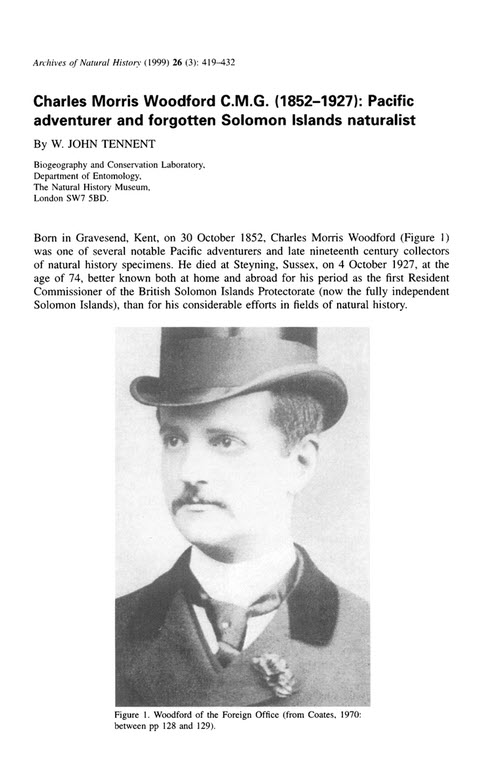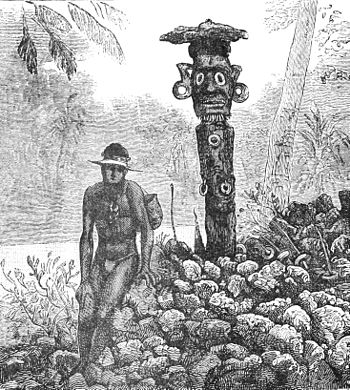7th May 1898
The Southern Cross got underway early in the morning to
carry on with her cruise, but when she had got about 2 miles from us she went
on shore on a coral bank our boats was called away and sent to her to render
any assistance which she would require, after working all day long taking out
her stores and all heavy gear, and placing out anchors we manged to get her off
by the evening tide without any material damage she then came back into harbour
and dropped anchor, we sent our divers away to examine her bottom and found it
was all right only a strip of copper off here and there just where she had
touched, during the day we were invited by the Royal Commissioner C. M.
Woodford having his wife & son with him
they stayed on board and lunched
with our Captain and on leaving he was saluted with 7 guns which greatly frightened
the Natives, the natives seems very much struck with our figure head, which is
a very good representation of a Mohawk Indian with a Tomahawk in his right hand
and a scalping knife in his left all ready to strike out at anything, the natives
collected around the bows, talking & making allsorts of grimaces at it, making
great fuss of the ship, they brought a canoe full of long grass which they kept
tying together till they made a line long enough to take the measurement of
the ship.
We are about the biggest and heaviest Man of War that has been here, so no doubt they are under the impression of building a War canoe on the samesize.
Source http://www.euppublishing.com/doi/abs/10.3366/anh.1999.26.3.419
Charles Morris Woodford
First Resident Commissioner of british Solomon islands protectorate and important (forgotten) Collector of Natural specimens
born Gravesend Kent 1852, Died Steyning Essex 1927
Hi s collection of Bats is at The Natural History Museum
Proceedings of the Zoological Society of London
Volume 55, Issue 2, pages 320–328, March 1887
CM Woodford Journal
Extract from link mentioning Tomohawk (see diary entry)
From the trading station at Rubiana, which is the center of
the head-hunting district, our first visit was to a small island occupied by
another trader. This island he is allowed to occupy on sufferance only. It
belongs to the natives of Sisieta; they will not sell it, as they use it for
their cannibal feasts. I was told that six bodies were eaten here a fortnight
before my visit. From here we went to a town called Oneavesi, and thence
crossed to the small island of Rubiana proper, where we found nearly all the
men away on a head-hunting expedition to the island of Isabel. I here
photographed the interior of a tambu house, the post of which was carved to
represent a crocodile. Along the rafters was a row of heads. I also took a
photograph of a collection of sacred images, near to which was a heap of
skulls, upon every one of which I noticed the mark of the tomahawk.

